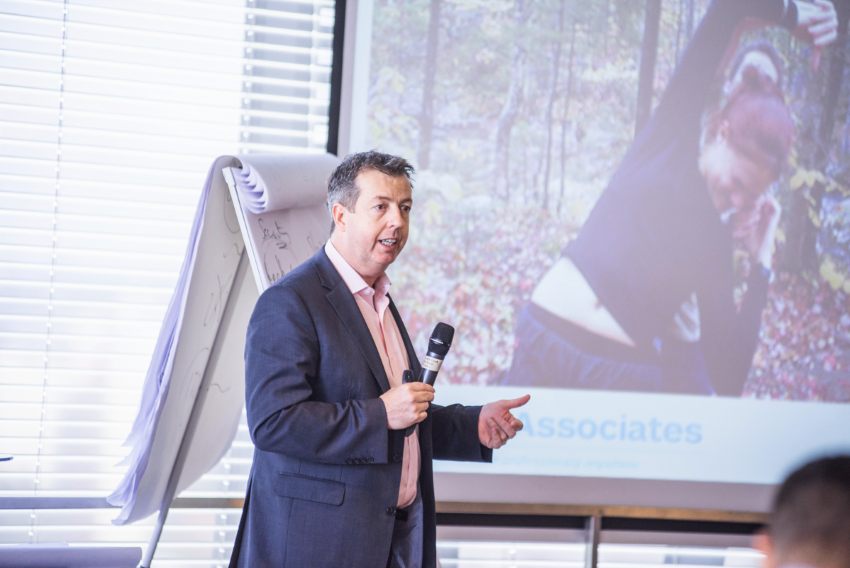Recently we recommended a seminar ran by Bob Dignen, our guest from United Kingdom. Bob is an expert in international leadership training and coaching. He is a Director at York Associates, a training company in the UK. We were happy to host Bob during the “Let’s Talk Business vol. 2” event organized by LEC CENTRE and York Associates in Olivia Sky Club, where he trained those present on how to effectively communicate in an international business setting.
“Let’s Talk Business” is a series of meeting for people who work in an international environment. They host international experts who share their knowledge and insight that helps to work more effectively with foreign business partners and clients. Let’s Talk Business is meant for managers and business owners who run branches of global corporations, work in international teams or sell their products and services on foreign markets.
This year’s seminar, titled “Effective leadership for international business” consisted of a 3-part workshop delivered by Bob Dignen. An introductory key note was delivered by Krzysztof Herdzik, a manager with over 15 years of experience in the business process off shoring industry, on managing diversified global teams in the light of the 4. technical revolution.
–/ —
Monika Bogdanowicz (Communications Olivia Business Centre): What differs working in a local environment from working in an international setting?
Bob Dignen (Specialist English and international communication training, York Associates, Author, numerous titles including ‘Leading International Projects’): The answers to this question are not what you might assume. For example, if you try to think yourself of the three major differences. After not a lot of thought you will probably decide on terms such as ‘language’, ‘culture’ and ‘time zones and distance’. These common sense notions are certainly part of the issue, but more fundamentally it’s about coping with four challenging dimensions.
Firstly, there are the higher levels of uncertainty – working with strangers, communicating in a foreign language so that you cannot be sure of the effective transfer of meaning). Then you have higher levels of complexity – life internationally tends to involve more complex projects and activities. Thirdly, the curious paradoxes of one’s own company – dealing with the lack of clear responsibilities and priorities in one’s own global-local environment, where organisations seems to have become disorganisation. Finally, diversity: with a greater range of perspectives, beliefs and professional behaviours which makes collaboration difficult. A word of warning. Don’t overestimate the role of national culture.
We love to think in terms of Poles, Americans, Brits, Germans etc. But this high level of abstraction is generally not very helpful in understanding the individuals in front of us. Remember, we never meeting cultures. We only meet individuals.
Monika Bogdanowicz: How to enhance dialogue in teams to reduce the risk of conflict and verying understanding of basic terms?
Bob Dignen: Human beings think about dialogue and conversation in very different ways. Some are long talkers, some are short. Some are direct, some are indirect. Despite the diversity, all of us have to manage three choices – we say nothing (silence), we talk at someone or we ask questions. The feedback from experienced international operators is very clear. We need to ask more when working in an international context. It generates learning. It can show respect. It includes different points of view in the decision making to support innovation. And clarification questions which confirm mutual understanding are gold.
Sounds simple? Yet human beings, having observed them for the last twenty years very closely, seem strangely reluctant to ask questions. Why? Fear, perhaps. Fear of looking stupid or incompetent. Fear of being seen to challenge the other. It’s a misplaced fear. Get asking questions deep into individual and organisational behaviour and things simply work better.

Monika Bogdanowicz: What would you suggest to managers who notice issues with ineffective communication in their teams and companies?
Bob Dignen: Of course, it will depend on which kind of ineffective communication is observed. Perhaps a simple piece of advice would be to … do something about it. Offer feedback. Coach people to become curious about their own behaviour and the impacts it can have on others. Create an environment where people can make mistakes safely, and learn from those mistakes. In a world of uncertainty, complexity, paradox and diversity, mistakes are inevitable. Of course, there’s also another answer to this question. Start to doubt that what you see as ineffective is actually ineffective. Stigmatising another as less effective is something we all love to do – it protects our sense of self and the illusion that we are good and others are bad.
Fundamentally, seeing the good in others’ behaviours which might superficially be seen as irritating or unprofessional, this is the real art of management, perhaps leadership.
Monika Bogdanowicz: What tips would you give to a manager trying to facilitate a positive attitude within an international team?
Bob Dignen: ‘Positive’ is difficult these days. People are generally overworked; they feel they are underpaid, and many feel under appreciated to the extent that they have begun to lose faith in their own management. Low staff engagement surveys bear testament to this phenomenon. I think a number of things breed positive emotions.
People like to feel appreciated – so positive feedback, a word of thanks really helps. People need to feel a sense of purpose and progress. So leaders need to provide a working framework which allows these two dimensions to be identified and lived. People also want to develop themselves, and feel that they are growing as people and professionals, and working along some form of loosely defined career path. A simple piece of advice to managers, to ensure these things are secured in people’s work experience, is to have regular informal 1:1s with their staff, once a month or bimonthly.
These personal check-ins are often undervalued by senior management and yet they can yield so much – motivation, alignment of perspectives and learning for the manager on what the workforce is actually thinking and experiencing.
Monika Bogdanowicz: How can a team of culturally diversified individuals positively impact the company’s value as a brand and what can managers do to utilise the team’s diversity for creating a competitive advantage?
Bob Dignen: Most companies define their brand as being one which respects and embraces diversity. I’m not sure diversity as such is a competitive advantage because, well, everyone’s doing it. Whether people are doing it well, probably not, is another question but I think diversity is becoming almost tired in a sense as a brand support. And remember, diversity is not always and only a positive. Diversity of belief, competence, priority and strategic perspective leads to huge fragmentation is organisations. This is why managers have to work so hard to onboard, to align, to build mutual commitment to a common goal. That’s not diversity, that’s uniformity.
I’m not sure that organisations have a fully coherent understanding of their relationship to diversity.
Monika Bogdanowicz: As human beings we prefer to work with people like us and by analogy we avoid situations where we face the unfamiliar (cultures, norms etc). How to manage communication to create a culture of effective communication in a team?
Bob Dignen: Some people enjoy the alien, the unfamiliar and can thrive on walking into unknown territories. They are few and far between, but there are some out there. The question, however, is around communication and creating a culture of communication. The simple advice is to communicate more about communication. Talk about expectations. Talk about experiences. Talk about frustrations. Talk about customer impact of poor communication.
And from the discussion, build action points – sometime singular but sometimes more general about how communication should be lived in general within the team, e.g. emails should be replied to in 24 hours, frustration should be communicated face to face, no silence is allowed on conference calls – people need to say what they think.
Ground rules and guidelines for behaviour, without making them artificial and hence redundant immediately, can be useful. And remember things like ‘listening’ and ‘openness’ are not behaviours. A behaviour is something tangible. Listening as a behaviour means saying nothing, for example, or making a noise, to show you agree and value or just understand. Different behaviours which mean the same thing cause confusion and inefficiency in teams, so why not agree which behaviours mean what, have which value and then do them.
‘Yes, but…’ can be seen by some teams as constructive searching for the truth; by others as a form of destructive negativity. For a team to be really effective, it needs to discuss behaviours and perhaps set rules. Curiously, after discussion, and I know what your behaviours mean, we often don’t need to align because I just know what you mean.
It’s so simple and yet curiously ignored as a focal point by international teams.

Monika Bogdanowicz: What are, according to you, the key success factors when working internationally?
Bob Dignen: There are no golden rules. Life is always situational and complex. However, staying aware, acting thoughtfully and taking the opportunity to learn through feedback if were successful or not, can be recommended. And don’t forget, international working life is not all about stress and challenge. It’s an amazing opportunity to engage with our world, and create a better future together for the next generations. Looking at the politicians around us these days, if we don’t do it, who will, I wonder?
Monika Bogdanowicz: Thanks a lot, Bob for your inspirational talk and recommendations for our business owner’s and employers.
–/ —
Bob Dignen. Bob has worked in the field of business and specialist English and international communication training for over twenty-five years. He delivers professional language training both in the UK and internationally, and also runs seminars and coaches in the field of international team and leadership competence. As an author, he has published numerous titles including ‘Leading International Projects’ (Kogan Page), ‘Managing Projects’ (Delta Publishing and York Associates), ‘Communication for International Business’ (Harper Collins) and ‘English for International Business Communication’ (Harper Collins). Bob delivers interactive presentations and speeches at professional English language conferences, and has also spoken at the events of professional bodies such as Toastmasters in France, the global IPMA conference (International Project Management Association) and regional CIPD workshops (Chartered Institute of Personnel and Development). In his free time, Bob enjoys jogging and photography. He is also a trustee of International Service, an overseas development charity.
York Associates is owned and run by Claret Holdings Ltd together with Bob Dignen, Richard Hawker, and Mike Hogan, who hold Executive Directorship roles. YA is supported by its excellent team of teachers, trainers and staff, all of whom help us to deliver high quality English language, professional communication, intercultural and leadership training. York Associates has been offering training in the language and communication field for over thirty years. It is well known in the international communication field through its publishing of books, multimedia materials, articles and conference presentations. In 2014 York Associates became a member of the Claret Group, which has training centres in the UK and on Malta.




